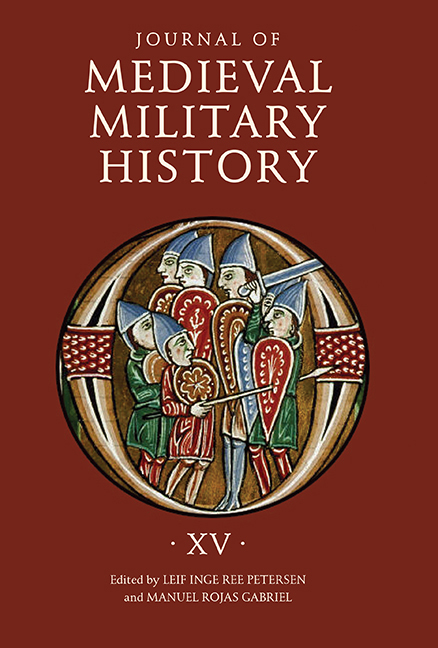Book contents
- Frontmatter
- Dedication
- Contents
- List of Illustrations
- Preface
- 1 Later Roman Grand Strategy: The Fortification of the urbes of Gaul
- 2 In Search of Equilibrium: Byzantium and the Northern Barbarians, 400–800
- 3 Evolving English Strategies during the Viking Wars
- 4 Norman Conquests: A Strategy for World Domination?
- 5 The Papacy and the Political Consolidation of the Catalan Counties, c. 1060–1100: A Case Study in Political Strategy
- 6 Alfonso VII of León-Castile in Face of the Reformulation of Power in al-Andalus, 1145–1157: An Essay in Strategic Logic
- 7 The Treaties between the Kings of León and the Almohads within the Leonese Expansion Strategy, 1157–1230
- 8 A Strategy of Total War? Henry of Livonia and the Conquest of Estonia, 1208–1227
- 9 The English Longbow, War, and Administration
- List of Contributors
- Journal of Medieval Military History
- De Re Militari and the Journal of Medieval Military History
7 - The Treaties between the Kings of León and the Almohads within the Leonese Expansion Strategy, 1157–1230
Published online by Cambridge University Press: 21 August 2019
- Frontmatter
- Dedication
- Contents
- List of Illustrations
- Preface
- 1 Later Roman Grand Strategy: The Fortification of the urbes of Gaul
- 2 In Search of Equilibrium: Byzantium and the Northern Barbarians, 400–800
- 3 Evolving English Strategies during the Viking Wars
- 4 Norman Conquests: A Strategy for World Domination?
- 5 The Papacy and the Political Consolidation of the Catalan Counties, c. 1060–1100: A Case Study in Political Strategy
- 6 Alfonso VII of León-Castile in Face of the Reformulation of Power in al-Andalus, 1145–1157: An Essay in Strategic Logic
- 7 The Treaties between the Kings of León and the Almohads within the Leonese Expansion Strategy, 1157–1230
- 8 A Strategy of Total War? Henry of Livonia and the Conquest of Estonia, 1208–1227
- 9 The English Longbow, War, and Administration
- List of Contributors
- Journal of Medieval Military History
- De Re Militari and the Journal of Medieval Military History
Summary
The main object of this paper is to analyze how the kings of León used diplomacy in order to make possible the territorial expansion of their kingdom at the expense of Muslim lands, a subject hitherto practically ignored by historians. It is well known that León had less potential for expansion than Castile and Portugal. The ambitions of these three adjacent kingdoms converged on Muslim territory, a fact that would cause countless armed conflicts between these Christian entities throughout the period in question. An appraisal of the diplomatic relations established by the Leonese attests that the truces they concluded with the Almohads allowed the kings of León to keep their area of expansion open despite the actions of their direct rivals. In the same manner, during the last stage of León's existence as an independent kingdom, its leaders finally focused on territorial conquest. As we shall see, for those campaigns, the kings of León relied quite often on the aid or cooperation of their neighboring kingdoms, thanks to a series of agreements reached with the respective rulers of those states.
Censorious judgments regarding the treaties, pacts, and alliances concluded between the Christian kingdoms and the Muslims are not common in the historiography of recent decades. Nonetheless, such remarks have not completely disappeared from the copious writing on the topic. For instance, for Manuel González Jiménez, the agreements between the kings of León and the Almohads were “alianzas contra natura” – unnatural alliances. Maria Alegria Marques and João Soalheiro describe as an “aliança espúria” – an illegitimate alliance – the pact arranged between Sancho VII of Navarre (1194–1234) and the caliph ‘Abd Allah al-Nasir (1199–1213). Pascal Buresi's view is slightly more nuanced, recognizing a difference between the Christian–Muslim treaties signed in the early years of the thirteenth century and those concluded previously, the last of which was between Sancho VII of Navarre and the Almohads, from 1198 to 1201. In positing such a distinction, he notes that in the earlier arrangements made among the Christian kings it was established that they should respect the truces which some of them might already have made, and that consequently they would not be able to aid other monarchs in their fights against the Almohads.
- Type
- Chapter
- Information
- Journal of Medieval Military HistoryStrategies, pp. 150 - 185Publisher: Boydell & BrewerPrint publication year: 2017

